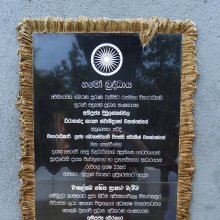Pe, Pê, Pē: 3 definitions
Introduction:
Pe means something in Hinduism, Sanskrit, biology, Tamil. If you want to know the exact meaning, history, etymology or English translation of this term then check out the descriptions on this page. Add your comment or reference to a book if you want to contribute to this summary article.
Images (photo gallery)
Biology (plants and animals)
Source: Google Books: CRC World Dictionary (Regional names)1) Pe in Ivory Coast is the name of a plant defined with Anchomanes difformis in various botanical sources. This page contains potential references in Ayurveda, modern medicine, and other folk traditions or local practices It has the synonym Pythonium hookeri Kunth (among others).
2) Pe in South America is also identified with Prosopis juliflora It has the synonym Neltuma bakeri Britton & Rose (etc.).
Example references for further research on medicinal uses or toxicity (see latin names for full list):
· Genera et species plantarum (1816)
· Saggio sulla Storia Naturale del Chili (1782)
· Publications of the Field Museum of Natural History, Botanical Series (1943)
· Systema Naturae, ed. 12 (1767)
· Las Leguminosas en la Agricultura Boliviana: Revision de Informacion (1996)
· Darwiniana (1975)
If you are looking for specific details regarding Pe, for example health benefits, pregnancy safety, side effects, chemical composition, diet and recipes, extract dosage, have a look at these references.

This sections includes definitions from the five kingdoms of living things: Animals, Plants, Fungi, Protists and Monera. It will include both the official binomial nomenclature (scientific names usually in Latin) as well as regional spellings and variants.
Languages of India and abroad
Sanskrit dictionary
Source: Cologne Digital Sanskrit Dictionaries: Edgerton Buddhist Hybrid Sanskrit DictionaryPe (पे).—(= Pali id.), abbreviation for peyālam, q.v.: Śikṣāsamuccaya 53.15; 55.18, etc.
Sanskrit, also spelled संस्कृतम् (saṃskṛtam), is an ancient language of India commonly seen as the grandmother of the Indo-European language family (even English!). Closely allied with Prakrit and Pali, Sanskrit is more exhaustive in both grammar and terms and has the most extensive collection of literature in the world, greatly surpassing its sister-languages Greek and Latin.
Tamil dictionary
Source: DDSA: University of Madras: Tamil LexiconPe (பெ) . The compound of ப் [p] and எ. [e.]
--- OR ---
Pē (பே) The compound of ப் [p] and ஏ. [e.]
--- OR ---
Pē (பே) noun Fear; அச்சம். பேஎமுதிர் கடவுள் [acham. peemuthir kadavul] (குறுந்தொகை [kurundogai] 87).
--- OR ---
Pē (பே) noun < phēna.
1. Foam, scum, froth; நுரை. (பிங்கலகண்டு) பேஎநாறுந் தாழ்நீர்ப் பனிச்சுனை [nurai. (pingalagandu) peenarun thazhnirp panichunai] (இறையனாரகப் பொருள் [iraiyanaragap porul] 7, உரை [urai]).
2. Cloud; மேகம். [megam.] (W.)
--- OR ---
Pē (பே) particle < Urdu bē. A prefix meaning 'no'; இல்லை என்னும் பொருள்தருஞ் சொல். [illai ennum porultharugn sol.] (W.)
Tamil is an ancient language of India from the Dravidian family spoken by roughly 250 million people mainly in southern India and Sri Lanka.
See also (Relevant definitions)
Starts with (+3738): Panti, Pe de galinha, Pe gagan, Pe ku la, Pe kulu la, Pe luan, Pe y peepetake, Pe-attip-pazham, Pe-bya-gale, Pe-di-sien, Pe-gya, Pe-kamisana, Pe-qui-che, Pe-yatti, Pe-yin, Pea, Pea, Pea, Pea, Pea eggplant.
Ends with (+474): Aarope, Abhyupe, Acarapradipe, Acotope, Acuradape, Adetippe, Adiguppe, African grape, Agape, Agutiguepe, Airan ope, Ajape, Akpe, Akpekpe, Alippe, Amangwe-amhlope, Anipe, Anpe, Antelope, Antelope skin.
Full-text (+82): Taa-pae, Ma pae, Thua pae, Ee pae, Ta-te-pe-ka-me, Ma kham pae, Peyincap, Prage, Pe-yatti, Naun-phak-pe, Pe gagan, Pe-attip-pazham, Pe kulu la, Pe-gya, Pe luan, Pe-qui-che, Fri ya pe, Pe ku la, Bo-sa-pe, Sadaw-pe.
Relevant text
One of your search terms exceeds the minimun character amount per search term. This amount currently equals 2.
No search results for Pe, Pê, Pē, Pae; (plurals include: Paes) in any book or story.
